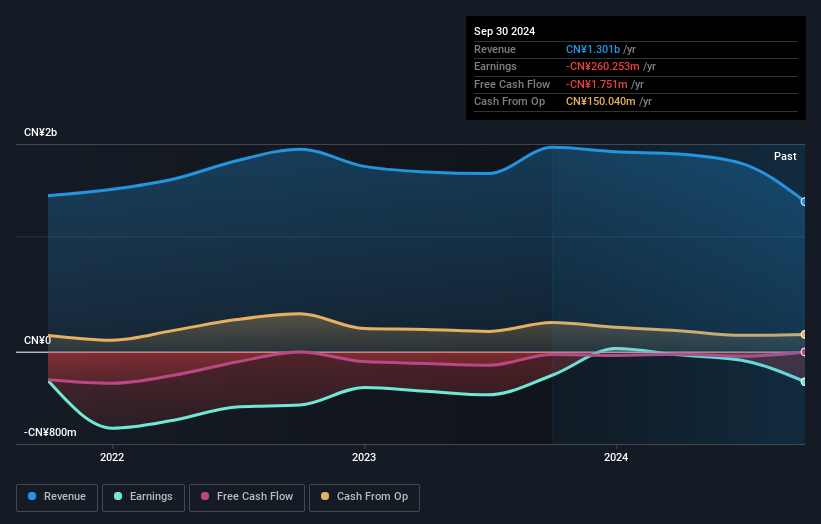Retail investors invested in Rastar Group (SZSE:300043) up 8.0% last week, insiders too were rewarded

Key Insights
- Significant control over Rastar Group by retail investors implies that the general public has more power to influence management and governance-related decisions
- The top 25 shareholders own 47% of the company
- 35% of Rastar Group is held by insiders
If you want to know who really controls Rastar Group (SZSE:300043), then you'll have to look at the makeup of its share registry. And the group that holds the biggest piece of the pie are retail investors with 53% ownership. In other words, the group stands to gain the most (or lose the most) from their investment into the company.
Following a 8.0% increase in the stock price last week, retail investors profited the most, but insiders who own 35% stock also stood to gain from the increase.
Let's take a closer look to see what the different types of shareholders can tell us about Rastar Group.
See our latest analysis for Rastar Group

What Does The Institutional Ownership Tell Us About Rastar Group?
Many institutions measure their performance against an index that approximates the local market. So they usually pay more attention to companies that are included in major indices.
We can see that Rastar Group does have institutional investors; and they hold a good portion of the company's stock. This implies the analysts working for those institutions have looked at the stock and they like it. But just like anyone else, they could be wrong. When multiple institutions own a stock, there's always a risk that they are in a 'crowded trade'. When such a trade goes wrong, multiple parties may compete to sell stock fast. This risk is higher in a company without a history of growth. You can see Rastar Group's historic earnings and revenue below, but keep in mind there's always more to the story.

Rastar Group is not owned by hedge funds. The company's largest shareholder is Yan Sheng Chen, with ownership of 33%. In comparison, the second and third largest shareholders hold about 2.5% and 2.0% of the stock.
On studying our ownership data, we found that 25 of the top shareholders collectively own less than 50% of the share register, implying that no single individual has a majority interest.
While it makes sense to study institutional ownership data for a company, it also makes sense to study analyst sentiments to know which way the wind is blowing. Our information suggests that there isn't any analyst coverage of the stock, so it is probably little known.
Insider Ownership Of Rastar Group
The definition of an insider can differ slightly between different countries, but members of the board of directors always count. The company management answer to the board and the latter should represent the interests of shareholders. Notably, sometimes top-level managers are on the board themselves.
I generally consider insider ownership to be a good thing. However, on some occasions it makes it more difficult for other shareholders to hold the board accountable for decisions.
It seems insiders own a significant proportion of Rastar Group. Insiders have a CN¥1.7b stake in this CN¥5.0b business. This may suggest that the founders still own a lot of shares. You can click here to see if they have been buying or selling.
General Public Ownership
The general public, mostly comprising of individual investors, collectively holds 53% of Rastar Group shares. This size of ownership gives investors from the general public some collective power. They can and probably do influence decisions on executive compensation, dividend policies and proposed business acquisitions.
Next Steps:
It's always worth thinking about the different groups who own shares in a company. But to understand Rastar Group better, we need to consider many other factors. Be aware that Rastar Group is showing 3 warning signs in our investment analysis , you should know about...
Of course this may not be the best stock to buy. Therefore, you may wish to see our free collection of interesting prospects boasting favorable financials.
NB: Figures in this article are calculated using data from the last twelve months, which refer to the 12-month period ending on the last date of the month the financial statement is dated. This may not be consistent with full year annual report figures.
New: AI Stock Screener & Alerts
Our new AI Stock Screener scans the market every day to uncover opportunities.
• Dividend Powerhouses (3%+ Yield)
• Undervalued Small Caps with Insider Buying
• High growth Tech and AI Companies
Or build your own from over 50 metrics.
Have feedback on this article? Concerned about the content? Get in touch with us directly. Alternatively, email editorial-team (at) simplywallst.com.
This article by Simply Wall St is general in nature. We provide commentary based on historical data and analyst forecasts only using an unbiased methodology and our articles are not intended to be financial advice. It does not constitute a recommendation to buy or sell any stock, and does not take account of your objectives, or your financial situation. We aim to bring you long-term focused analysis driven by fundamental data. Note that our analysis may not factor in the latest price-sensitive company announcements or qualitative material. Simply Wall St has no position in any stocks mentioned.
About SZSE:300043
Low and overvalued.
Market Insights
Community Narratives




